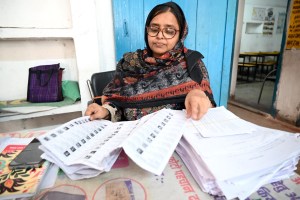1.5 lakh stubble management machines on paper, 1 lakh on ground: Mismatch, no streamlining hit small farmers hard
With just a week left to sow his next crop — carrot — 55-year-old Sukhdev, a marginal farmer from Shatabgarh village in Kapurthala district, was racing against time and did everything possible in his hands to get a machine in time.
 Sukhdev, who cultivates paddy varieties PR-126 and PR-110 on his own land and on some rented acres, feels increasingly helpless with the government fixing paddy sowing dates after June 15.
Sukhdev, who cultivates paddy varieties PR-126 and PR-110 on his own land and on some rented acres, feels increasingly helpless with the government fixing paddy sowing dates after June 15.After harvesting paddy on September 26, Sukhdev Singh made multiple rounds to the local cooperative society and the custom hiring center to rent a machine to process the crop stubble.
With just a week left to sow his next crop — carrot — 55-year-old Sukhdev, a marginal farmer from Shatabgarh village in Kapurthala district, was racing against time and did everything possible in his hands to get a machine in time.
However, when he couldn’t hire one by October 1, he burnt the paddy stubble on his 1.5 acres. And bang! The next morning he was booked in an FIR and was also fined Rs 2,500.
Sukhdev’s story highlights the struggle of several small scale farmers in Punjab who want to comply with government mandates for crop residue management, but resort to burning stubble out of sheer desperation when unable to lay hands on a machine even after weeks of running from pillar to post.
“Give me the machine and I will not burn crop residue. I had no means to manage the stubble. My carrot sowing got delayed as stubble was left on the field after the paddy harvest. Despite efforts to hire a machine, none was available. The government says they have distributed numerous machines, but on the ground, nothing is available for small farmers like us,” Sukhdev said, questioning why there is no action against industries polluting Sutlej river and Buddha Nalla.
While the Supreme Court has mandated stricter measures against stubble burning to curb air pollution, Sukhdev says that it should also take into account the severe water pollution in Punjab caused by industrial effluents. “If the government can enforce laws against us, why not against those who poison our rivers? It seems only small farmers are being tragetted while the big guys go scot-free,” he said.
Sukhdev, who cultivates paddy varieties PR-126 and PR-110 on his own land and on some rented acres, feels increasingly helpless with the government fixing paddy sowing dates after June 15. “Earlier, we could plant paddy in early June, harvest it sooner, and manage the stubble more easily. Now, we don’t even have that window,” he said.
Sukhdev’s case reflects the widening gap between government policies and their on-ground implementation, particularly for small and marginal farmers.
Inder Jeet Singh, a 21-year-old farmer, whose agricultural land falls in Lakh Waryah village in Sultanpur Lodhi, was also booked for burning stubble on his 4 acres on October 2 despites attempts to manage it using both ex-situ and in-situ methods.
Inder Jeet had sown hybrid paddy variety 7301, which is in the middle of a storm due to its alleged low milling outturn. “Rice shellers are rejecting this variety, and despite the MSP of Rs 2,320 per quintal, arhtiyas are only offering me Rs 2,000 per quintal, which means a loss of Rs 10,000 to Rs 12,000 per acre,” he said, adding that on top of that, he was fined Rs 6,500 for stubble burning and was also booked.
“I initially opted for ex-situ stubble management and contacted a baler to make straw bales, but due to the narrow access to my field, the baler could not reach. I then tried to get in-situ machines like mulchers, rotavators, and MB ploughs, but these require big tractors, and the cost for renting them is beyond my capacity. Each machine costs Rs 1,500 to Rs 1,600 per acre, which means I need to spend Rs 6,000 to Rs 7,000 just to prepare my field for the next crop,” he said, adding that on paper, it’s easy to say that machines are available, but in reality, most societies have just one or two machines and its not enough.
Pritpal Singh, 34, was booked for burning stubble on 1.5 acres in Kandhala Guru village in Jalandhar on October 17.
Pritpal’s father Rashpal Singh said that a local dairy owner had already cleared most of the stubble from their fields. “We burnt only a a small amount as there was no machine available to manage it. In our entire village, there is no machine that we could rent,” he said, adding that an FIR was lodged against him under Section 223 of BNS.
Sarpanch Sunny Kumar added that three other villagers also burnt the stubble but those were not recorded in the satellite monitoring. “This raises concerns about the accuracy of the monitoring process,” he said.
As paddy harvesting is in full swing across Punjab, the pressure on small farmers is intensifying. Without viable alternatives, they find themselves caught between environmental regulations and financial losses, said BKU (Dakaunda) general secretary Jagmohan Singh.
He added that despite the increasing number of machines in Punjab, small and marginal farmers have limited access to it. “The machines are quite heavy and require a heavy tractor for operation. The hiring charges for these machines range from Rs 5,000 to Rs 6,000, which many small farmers cannot afford. Around 1.50 lakh CRM machines have been distributed on subsidy since 2018. These have been distributed by the Punjab government to some big farmers, farmers’ groups, panchayats, and cooperative societies. However, due to wear and tear, along with technological advancements, over 50,000 machines will not be operational this season,” he said, adding that the distribution of these machines is yet to be streamlined but even then the government is collecting fines and registering FIRs against helpless farmers.
Till October 27, Punjab has imposed Rs 18.27 lakh environmental compensation in 678 cases . In another 45 cases, environmental compensation is yet to be imposed. In 669 cases, red entry has been made in land records. While in seven cases FIR has been filed under Section 39 of Air Pollution Act, 1981, in most of the others cases have been registered under Section 223 of BNS (disobedience to orders promulgated by public servants).
When asked, director of Punjab Agriculture Department Jaswant Singh said that they have been spreading awareness on a large scale but still some farmers are resorting to stubble burning.
“Since 2018, the government has distributed a significant number of machines. “While 27,747 machines were given in 2018–19, it was followed by 23,068 in 2019–20, 25,811 in 2020–21, 13,796 in 2021–22, 27,214 in 2022–23, and 13,215 in 2023–24. Until last year, the government distributed 1,30,851 machines and this year it had proposed to give 20,000 more, of which 6,000 have already been distributed. Subsidies range from 50 per cent for individual farmers to 80 per cent for farmer groups, panchayats, and cooperative societies, making these machines more accessible to the farming community,” he said, adding that they have appointed nodal officers to cover all the villages and farmers have been provided with the contact of custom hiring centres from where they can get machines.
However, in Inder Jeet’s words, “There are machines on the ground but only for big farmers. The government on the behest of the courts are penalising farmers but they don’t see that we are the first victims of stubble burning and in turn pollution. Instead of booking us, they should first streamline things on the ground.







